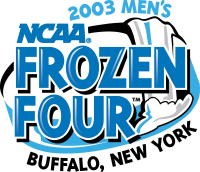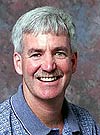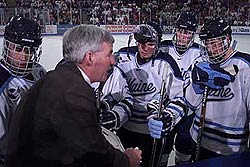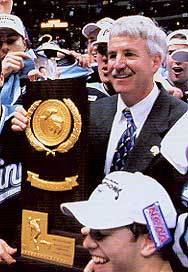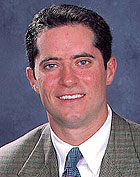“Wasn’t that a great game? What a great game that was for college hockey!”
– Shawn Walsh, March 10, 1991
You can’t do anything about the length of your life, but you can do something about its width and depth.
– Evan Esar
Somehow, the game of college hockey seems a little emptier today. Like it’s missing something.
Shawn Walsh passed away. The words seem like they don’t flow right, don’t belong together. He had conquered so much in his life, done what people told him couldn’t be done. Surely, he was going to beat this too. Wasn’t he?
But sometimes the Great Scorekeeper in the Sky has other plans.
I came to know Shawn for the first time a little over 10 years ago. I won’t lie to you. I didn’t like him much at first. He seemed to be the complete opposite of what I liked about college hockey. Little did I know.
When Shawn arrived at Maine in 1984, he was a renegade in every sense of the word. The brash Midwesterner who would shake up the Eastern hockey establishment. He threw all the books out the window and did things his way. He prided himself, among other things, on knowing the rules and using them to his team’s advantage as much as possible. It was Shawn who noticed, during a game in 1990, that the CCM logos on BC’s pants were larger than allowed by NCAA rules. He threatened to seek a forfeit, resulting in the bizarre situation where the Eagle trainers had to hurriedly snip the logos off the team’s uniforms between periods.
If I talked about a Merrimack player who was one to watch, he highlighted that and gave it to his guy whose job it was to stop that player. I kidded Shawn that I was going to start making things up to throw him off, say that such and such a fourth liner was having the season of his life. He laughed and said that he knew there was no way I would do that, and he was right.
And the illegal stick penalty was made for him. If Maine was behind by a goal late, it wasn’t unusual to suddenly have an illegal stick call against one of the opposing players. And more often than not, Shawn won the challenge, drawing his team a late power play and opportunity to tie.
This kind of behavior didn’t earn him a lot of friends outside Maine. Rumors even persisted that he was having someone sneak over to check the sticks of the other team before the game, writing down the ones that were illegal in case Shawn needed to pull a rabbit out of his hat later on.
I didn’t like a lot of this. It wasn’t what I had become accustomed to from most other coaches. But Shawn wasn’t most other coaches.
Before there was a USCHO, before there was a “web” and before most of the public knew what the Internet was, there was HOCKEY-L, an e-mail list that still goes strong today but was once the lone online beacon for college hockey. I posted a lot of messages in those days while I was getting started broadcasting for Merrimack, and I didn’t always have kind things to say about Shawn. I was younger and spoke up a lot about what I thought was right.
It was after one such criticism related to the stick incidents that I was surprised to get a message from Shawn through one of his secretaries. He denied the stick rumor, and then he asked to meet me before a Merrimack-Maine game.
After getting over my initial shock that he was even paying attention, I agreed, but I didn’t know what to expect. Was he going to rake me over the coals? Yell at me for daring to be critical of him?
Far from it.
I knocked on his Alfond Arena office door, opened it and introduced myself. Joe Carr, the terrific former Maine play-by-play man, was wrapping up a pregame radio interview with him. As Joe left, Shawn shut the door, shook my hand and offered me a seat. For the next half hour or so, we talked about all sorts of things related to college hockey. He didn’t have the slightest problem with anything I had said about him. He just wanted to talk, get my opinions on some topics, give me his on others. It was then that I realized something about Shawn Walsh. He really loved this game. I thought I had a passion for it. But what I had was nothing compared to him.
Soon I learned that Shawn was taking printouts of game stories I had written, highlighting certain parts and dropping them in his players’ lockers. If I praised a Black Bear for something, Shawn highlighted that and made sure his guys knew. It gave them a little boost, he said. If I talked about a Merrimack player who was one to watch, he highlighted that and gave it to his guy whose job it was to stop that player. I kidded Shawn that I was going to start making things up to throw him off, say that such and such a fourth liner was having the season of his life. He laughed and said that he knew there was no way I would do that, and he was right.
If he was on hand to scout a game when Maine wasn’t playing and we were on the air, he was always gracious enough to come on between periods for an interview. I was always struck by the way he punctuated every issue with the phrase “for the good of college hockey.” He discussed the change to the single-elimination regional NCAA format, which he admitted did not work to Maine’s advantage but which, nonetheless, he thought was for the overall good of the game.
I saw this over and over. After Shawn’s Black Bears lost a heartbreaker to BU in the 1991 Hockey East Championship Game, on a beautiful overtime goal by Shawn McEachern, he came into the interview room at the old Boston Garden, emotionally drained. He walked to the podium, looked up at the reporters, and suddenly smiled. “Wasn’t that a great game? What a great game that was for college hockey!” He’d say that many more times over the upcoming years, win or lose.
The 1992-93 season was magical for Maine hockey. A 42-1-2 record and, finally, an NCAA championship in a storybook fashion, with a three-goal third period comeback. Shawn exhorted his team on with the phrase, “Seven’s heaven, boys! Seven’s heaven!” a reference to the seven championships Maine would capture that season.
And, not to forget, a Hobey Baker Award for fabulous freshman Paul Kariya.
As happy as I was for Kariya, I felt for captain Jimmy Montgomery, who had quietly gone about becoming the all-time leading scorer in Eastern college hockey in the shadows of great players before him like Jean-Yves Roy and Scott Pellerin, only to be eclipsed in the spotlight as a senior by a kid who comes along only once in a lifetime. This was not lost on Shawn.
As Kariya rose to accept the Hobey, Shawn urged his quiet and unassuming captain to stand with him for pictures holding the trophy, and the roar in the room was deafening as Montgomery stood and smiled alongside his protege. It was one of the classiest moments I’ve seen. It sent a chill down my spine. It’s been said that the clearest reflection of a coach is the way his players carry themselves. That was never more true than on that day.
A year later came one of the darkest days in Hockey East history. After a slew of forfeits for using ineligible players, the league decided to ban Maine from the playoffs, touching off a court battle that threatened to tear the league apart. An injunction allowed the Black Bears to compete, and they went to BU for a quarterfinal series that was one of the most emotional ever, won by the Terriers.
Less than a month later, the Terriers had defeated Minnesota to earn a berth in the NCAA championship, and BU fans were celebrating in the hotel afterwards when Shawn happened by. Before long he was holding court with this group of diehards, talking college hockey into the wee hours of the morning. “Who’ll be the players to watch next year? What’s your All-Hockey East team?” People tossed around names, he offered opinions on them, listened to opinions on others. Just a bunch of people sitting around talking about how much they loved this game.
I threw out a name for him. “Martin Legault,” the diminutive backstopper for the Warriors. Shawn shook his head and said, “No way.” The next year, Legault became the first Warrior ever named All-Hockey East. I had to remind Shawn of our conversation the previous March. “I told you!” He laughed and said, “I didn’t think he’d be that good!”
As the years went by, our chats in his office became a regular thing. And they turned to other topics. Family, the future. The NCAA cloud was hanging over him and the program. Shawn was a stickler for knowing the rules of the game, but when it came to the rules of the NCAA, it seemed to be a different story. At the same time, off the ice he was going through a difficult divorce. It was then that I started to learn about Shawn Walsh the human being.
Worried about the future, about losing his kids. Rumors were abounding that he’d be asked to leave Maine, or that he would leave of his own accord, maybe for another school to start anew, maybe for the NHL. I asked him, “What will you do, why not move on?” He shook his head and, as he pointed to a photograph on his desk of his two boys, Tyler and Travis, I saw a tear come to his eye. But he quickly fought it back and said, “They’re why.” I didn’t have to ask anything more. Shawn always did a masterful job of keeping his personal and professional life separate, but there’s no question as to the effect it had on him.
And then came the period you could call the rebirth of Shawn Walsh. You don’t often get second chances in life. He did and he made the most of them, and he never stopped appreciating it. He rebuilt Maine into a national power, and won another NCAA Championship, this time with another Kariya, and with only 16 scholarships. He upheld the faith that Maine fans had in him. But more importantly than this, and something I was even happier about, he found love again.
It was around this time that I was going through a difficult time of my own. Knowing of his journey, and how things had worked out for him, I sought his advice one day. “How do you get through it?” I wondered. A question I knew was simple and yet complex at the same time. His reply was the same. “One day at a time,” he said, “and never give up.” Easier said than done, I thought, and probably even said so out loud. As I left to prepare for that night’s broadcast, I wished him luck as I always did, “but not too much.” He grinned and said to hang in there. I walked out thinking that he had probably had this conversation and given this advice to tens, maybe hundreds of his players many times before.
As it turned out, he was right. A year or so later, I sat in his office with Kelly several hours before a game at Maine, and he made her feel at home. Asked her a lot about her alma mater, BU, looking for a scouting report — of course. As we left 45 minutes later, he ushered a recruit and his parents in. Never did he let on that he had something more important to do.
When the terrible news came about his battle for his life, it was a shock to everyone. I couldn’t make it up for the game at Maine that fall, but when Maine came in several months later, I made sure to catch up with him, even for a minute after the game. The strain of everything he had been through was evident on his face. For the first time I was really worried, but I didn’t let on. I said, “I don’t know if you remember, but this is …” and he cut me off, smiled, and said, “Of course I remember Kelly,” and chatted with us for a few minutes before he had to go. That’s the way he was.
Seeing him a few weeks later at the FleetCenter, and then in Worcester at the NCAA East Regional, he looked like the Shawn of old. Fiery, determined, willing his team on, and they took their cue from him. He got the gate for riding the referee as Maine went down to defeat to a great BC team in a gutty performance that mirrored his own struggle. It would be, as it turned out, his last game. “Never give up.” But the opponent was just too strong on that day.
Somehow it seems fitting, even though we didn’t know it at the time.
When I heard the news Monday, I thought back to that chat in his office a couple of years ago. “Next time I’m in town, or you’re here, give me a call, I’ll take you to lunch.” I said okay, and then I never took him up on it. I wish I had. I wish I could now. I’d pay.
Let me be clear. I didn’t know Shawn as well as many people did. We weren’t best friends. More like acquaintances. We had maybe a few extended conversations a year. But they were always interesting and gave me something to think about. Shawn had a lot of friends and it seemed that if you met him once, you were his friend for life. I didn’t like some of the things he said or did, but I came to respect, understand and like him in a way I didn’t before. And I’m glad I got to know him in the way that I did. It started with college hockey but it turned into a lesson in life.
I know he touched a lot of people along the way. I’m glad to say I’m one of them, and I never thought that would be the case. Shawn may have been a successful coach, but more than that, he was a great builder of men, and, when you got right down to it, a person who simply loved this game and was instrumental in its growth to new heights. And he was a human being who made the most of his time on this earth, yet always gave his time to people who needed it.
I thought he was the complete opposite of everything I liked about this game. I found out I was wrong. In many ways, he was what I loved about it.
Somewhere up in the sky there’s a Zamboni finishing the ice. Players standing in anticipation on the bench, shaking the cobwebs out, nervous. Sticks rattling against the boards. Then a silver haired man, clipboard in hand, rises up behind them. “Here we go, boys! Here we go! Seven’s heaven! Seven’s heaven!”
And it is.
Rest in peace, Shawn. We’ll see you after the game.
